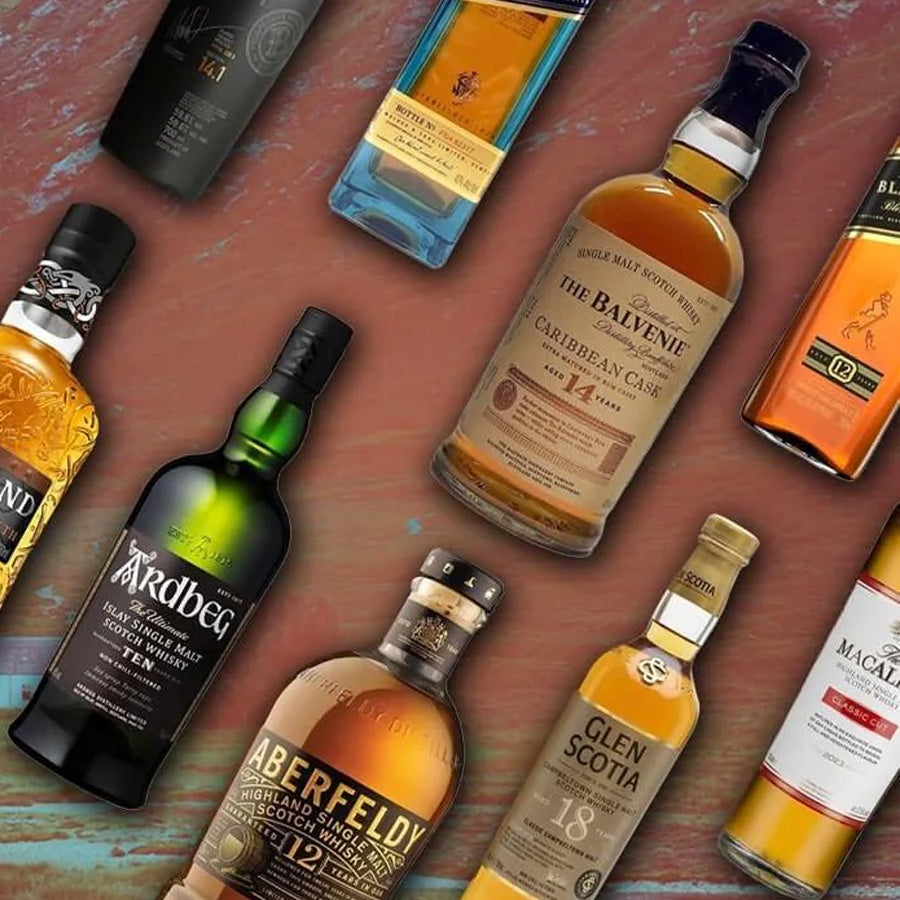
Joseph Magnus & Company
a shrewd businessman with a flair for the dramatic and an irresistible addiction to the sublime.
Magnus’ story begins all the way back in the young, war-torn America of the middle nineteenth century. In the midst of the Civil War in 1864, young Magnus received news that his father had been killed in battle. With three younger siblings to take care of, he matured quickly and took on the responsibility of caring for his siblings. His late father had been a merchant, and Magnus took after him to become a savvy businessman. He soon discovered a niche market for wholesale liquors, and by the time he was twenty-six he had painstakingly built up a liquor empire based out of Cincinnati, Ohio.

Magnus prided himself not only on the quality and age of his spirits, but on intelligent and honorable business methods. Excellent whiskey, he recognized, was more than simply a pleasant experience for the drinker – it was a means of promoting good conversation, close fellowship, and “the interchange of kindly deeds and pleasant thoughts.”
The drinkers of Murray Hill Club Whiskey were, in accordance with Joseph’s vision, people of discriminating taste and mature judgement. Joseph actively introduced his whiskey into the leading bars, hotels, cafes, and groceries of his day. Local newspapers were peppered with advertisements for this new whiskey, which quickly earned great acclaim. He encouraged readers to sample just a taste, for “give this whiskey a trial once, and you’ll take no other brand.”
In 1918, the imminent arrival of National Prohibition caused Magnus to pause his whiskey production and sales. For the remainder of his life, Magnus enjoyed but did not produce fine spirits. His four children grew up and started families of their own, and the story of their father’s success began to fade into legend. Stories and a few dusty artifacts were all that remained.
Then, nearly a century later, a fortunate discovery was made by one of Magnus’ great-grandsons: a few carefully preserved bottles of 122-year-old Murray Hill Club Whiskey, tucked away and seemingly forgotten. The possibility of having an original, unadulterated remnant of Magnus’ famed whiskey was incredibly exciting and also carried a weight of responsibility to do justice to this beautifully aged and preserved bottle.
To make sense of this rare find, the family gathered industry veterans to extract a few milliliters from the famed bottle, to taste, test, and reproduce, if possible. These experts were stunned to discover it to be one of the greatest bourbons they had ever tasted.

Joseph A. Magnus was a real life distiller in the 1800s who shuttered his business during prohibition. His great grandson sought to resurrect the family trade, and chose the District as the distillery’s new home; recent DC laws permitting spirit sales on premises make the city an attractive place to produce liquor. The Bourbon is aged eight years, inspired by 100 more. Magnus may be new, but they’re not starting from scratch. Legacy aside, the distillery was put together by a team of industry vets that includes former Woodford Reserve distiller Dave Scheurich, Nancy “The Nose” Fraley—a high-ranking whiskey blender—Richard Wolf of Buffalo Trace, Brett Thompson and former Gin Joint bartender Nicole Hassoun.
Today, using the same blending and finishing techniques Joseph Magnus employed over 100 years ago, Magnus Master Blender, Nancy Fraley, finishes 12-year-old bourbon in a triple cask finishing process using Oloroso Sherry, Pedro Ximénez, and Cognac casks. The result is that we have come as close as possible to the original Joseph Magnus Bourbon in that 122-year-old bottle.
a shrewd businessman with a flair for the dramatic and an irresistible addiction to the sublime.
Magnus’ story begins all the way back in the young, war-torn America of the middle nineteenth century. In the midst of the Civil War in 1864, young Magnus received news that his father had been killed in battle. With three younger siblings to take care of, he matured quickly and took on the responsibility of caring for his siblings. His late father had been a merchant, and Magnus took after him to become a savvy businessman. He soon discovered a niche market for wholesale liquors, and by the time he was twenty-six he had painstakingly built up a liquor empire based out of Cincinnati, Ohio.

Magnus prided himself not only on the quality and age of his spirits, but on intelligent and honorable business methods. Excellent whiskey, he recognized, was more than simply a pleasant experience for the drinker – it was a means of promoting good conversation, close fellowship, and “the interchange of kindly deeds and pleasant thoughts.”
The drinkers of Murray Hill Club Whiskey were, in accordance with Joseph’s vision, people of discriminating taste and mature judgement. Joseph actively introduced his whiskey into the leading bars, hotels, cafes, and groceries of his day. Local newspapers were peppered with advertisements for this new whiskey, which quickly earned great acclaim. He encouraged readers to sample just a taste, for “give this whiskey a trial once, and you’ll take no other brand.”
In 1918, the imminent arrival of National Prohibition caused Magnus to pause his whiskey production and sales. For the remainder of his life, Magnus enjoyed but did not produce fine spirits. His four children grew up and started families of their own, and the story of their father’s success began to fade into legend. Stories and a few dusty artifacts were all that remained.
Then, nearly a century later, a fortunate discovery was made by one of Magnus’ great-grandsons: a few carefully preserved bottles of 122-year-old Murray Hill Club Whiskey, tucked away and seemingly forgotten. The possibility of having an original, unadulterated remnant of Magnus’ famed whiskey was incredibly exciting and also carried a weight of responsibility to do justice to this beautifully aged and preserved bottle.
To make sense of this rare find, the family gathered industry veterans to extract a few milliliters from the famed bottle, to taste, test, and reproduce, if possible. These experts were stunned to discover it to be one of the greatest bourbons they had ever tasted.

Joseph A. Magnus was a real life distiller in the 1800s who shuttered his business during prohibition. His great grandson sought to resurrect the family trade, and chose the District as the distillery’s new home; recent DC laws permitting spirit sales on premises make the city an attractive place to produce liquor. The Bourbon is aged eight years, inspired by 100 more. Magnus may be new, but they’re not starting from scratch. Legacy aside, the distillery was put together by a team of industry vets that includes former Woodford Reserve distiller Dave Scheurich, Nancy “The Nose” Fraley—a high-ranking whiskey blender—Richard Wolf of Buffalo Trace, Brett Thompson and former Gin Joint bartender Nicole Hassoun.
Today, using the same blending and finishing techniques Joseph Magnus employed over 100 years ago, Magnus Master Blender, Nancy Fraley, finishes 12-year-old bourbon in a triple cask finishing process using Oloroso Sherry, Pedro Ximénez, and Cognac casks. The result is that we have come as close as possible to the original Joseph Magnus Bourbon in that 122-year-old bottle.
Sorry, there are no products in this collection
- Featured
- Best selling
- Alphabetically, A-Z
- Alphabetically, Z-A
- Price, low to high
- Price, high to low
- Date, old to new
- Date, new to old





